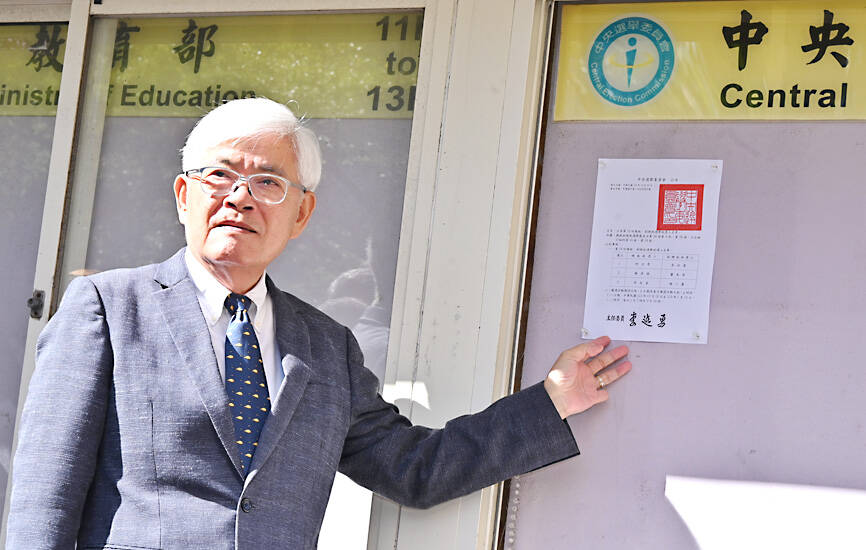The campaign for the Jan. 13 presidential and legislative elections officially starts today and is to last 28 days until Jan. 12, the Central Election Commission (CEC) said yesterday.
The hours that candidates are allowed to hold their campaign activities are from 7am to 10pm, CEC Chairman Lee Chin-yung (李進勇) told a news conference.
The order in which candidates are to be listed on the presidential ballot was also officially announced by Lee at the event, after a lottery was conducted earlier this week.

Photo: Liu Hsin-de, Taipei Times
Taiwan People’s Party Chairman and presidential candidate Ko Wen-je (柯文哲) and his running mate, Cynthia Wu (吳欣盈), secured the top position on the ballot, while Vice President William Lai (賴清德), the Democratic Progressive Party’s (DPP) presidential candidate, and former representative to the US Hsiao Bi-khim (蕭美琴) drew the second position, and New Taipei City Mayor Hou You-yi (侯友宜), the Chinese Nationalist Party’s (KMT) presidential candidate, and his running mate, Jaw Shaw-kong (趙少康), placed third.
About 19.5 million eligible voters, including about 1.03 million first-time voters, will be able to cast ballots at 17,794 polling stations around the country that are to be open from 8am to 4pm, the commission said.
Taiwan does not allow absentee ballots or early voting.
The exact number of eligible voters is to be announced on Jan. 9, CEC Vice Chairman Chen Chao-chien (陳朝建) said.
Lee urged the media to adhere to the principles of impartiality and fairness when reporting on election-related issues.
Regarding public opinion polls, Lee said such activities need to list key details, including the name of the organization conducting the survey, the time, method, numbers, margin of error and source of funding.
Starting from Jan. 3, citing, publishing, disseminating, reporting or commenting publicly on any opinion polls pertaining to the elections or the candidates would not be permitted, Lee said.
The prohibition applies to political parties, the news media, polling companies and individuals, the CEC said.

POSITIVE DEVELOPMENT: Japan and the US are expected to hold in-depth discussions on Taiwan-related issues during the meeting next month, Japanese sources said The holding of a Japan-US leaders’ meeting ahead of US President Donald Trump’s visit to China is positive news for Taiwan, former Japan-Taiwan Exchange Association representative Hiroyasu Izumi said yesterday. After the Liberal Democratic Party’s landslide victory in Japan’s House of Representatives election, Japanese Prime Minister Sanae Takaichi is scheduled to visit the US next month, where she is to meet with Trump ahead of the US president’s planned visit to China from March 31 to April 2 for a meeting with Chinese President Xi Jinping (習近平). Japan and the US are expected to hold in-depth discussions on Taiwan-related issues during the

‘LIKE-MINDED PARTNER’: Tako van Popta said it would be inappropriate to delay signing the deal with Taiwan because of China, adding he would promote the issue Canadian senators have stressed Taiwan’s importance for international trade and expressed enthusiasm for ensuring the Taiwan-Canada trade cooperation framework agreement is implemented this year. Representative to Canada Harry Tseng (曾厚仁) in an interview with the Central News Agency (CNA) said he was increasingly uneasy about Ottawa’s delays in signing the agreement, especially as Ottawa has warmed toward Beijing. There are “no negotiations left. Not only [is it] initialed, we have three versions of the text ready: English, French and Mandarin,” Tseng said. “That tells you how close we are to the final signature.” Tseng said that he hoped Canadian Prime Minister Mark Carney

President William Lai (賴清德) yesterday bestowed one of Taiwan’s highest honors on Saint Vincent and the Grenadines (SVG) Ambassador Andrea Clare Bowman in recognition of her contributions to bilateral ties. “By conferring the Order of Brilliant Star with Grand Cordon on Ambassador Bowman today, I want to sincerely thank her, on behalf of the Taiwanese people, for her outstanding contribution to deepening diplomatic ties between Taiwan and SVG,” Lai said at a ceremony held at the Presidential Office in Taipei. He noted that Bowman became SVG’s first ambassador to Taiwan in 2019 and

A man walks past elementary school artworks at the Taipei Lantern Festival in Ximen District yesterday, the first day of the event. The festival is to run from 5pm to 10pm through March 15.